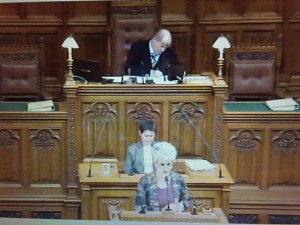City Council Vienna, Budget Discussion, 12 December 2016
EUROPE Birgit Meinhard-Schiebel
A week ago yesterday, something happened, the importance of which may only become apparent in a few years.
The Austrian population made a choice and thus took a decision which was noted all over the world.
Politics during the last months had been characterized by an almost unstoppable rise of right populist and extreme right parties and by so-called ‘anger votes’ at referenda, which quite often left behind them a ‘political pile of broken glass’.
But on December 4, something happened, that seems like a fairy tale, considering the events worldwide: A small people in Central Europe defies the tendency noted everywhere and clearly rebuffs rightwing populism and demagogics!
Many analyses have already been published and still will be, but one thing seems certain: the topic “Europe” was a decisive factor that Alexander Van der Bellen, contrary to all predictions and polls, won with almost 54% of the votes – a ‘landslide’ against Norbert Hofer.
He credibly and convincingly argued, that in view of the current crises MORE Europe and a closing of the ranks of the EU-members is needed, instead of an encapsulation and avocation of nationalist resentments. While the FPÖ collaborates closely, on the EU level, with numerous extreme right parties, whose open aim it is to destroy the European Union, and barely hides its sympathies with various authoritarian regimes, Van der Bellen, tirelessly repeated the importance of a democratic, constitutional European path and that Austria’s foreign policy and the Federal President should never abandon this path. This assessment was supported by a majority of Austrians and – by almost two thirds of Viennese.
Now let me turn to Vienna’s politics towards Europe.
My predecessor as deputy chairperson of the European Committee was, for many years, Alexander Van der Bellen, our president elect. Also in Vienna, he always stood for the same positions which gained him the confidence in the election on 4 December.
The Vienna Council Committee for European and International Affairs, founded 6 years ago, and chaired successively by Elisabeth Vitouch, the current state secretary Muna Duzdar and during the last few months by Peter Florianschütz, is based on exactly this position: Vienna, a cosmopolitan city, active on a European scale, participating in international city networks, such as EUROCITIES, and, in many aspects still leading, such as for instance in affordable housing.
Of course, the city’s interests are never neglected – I am thinking here about the guarantee of public services and the opposition to tendencies of deregulation and privatization. Also, the instrument of assessing the non-compliance with the subsidiarity principle, conferred to the city council in 2011, sometimes is helpful.
But all these activities are not ‘lobbying for our own sake’ but for common solutions in the spirit of European solidarity.
I would like to stress here that EU-money plays an important role in coping with these challenges – especially from ERDF (European Regional Development Fund) and the ESF (European Social Fund). Cross-border projects with neighboring countries can be financed by the INTERREG V-A Program, I would also like to mention the cooperation program CENTROPE.
When we are talking about budget, we should not omit this reference, and not believe rumors that the ‘EU and Brussels are sucking us dry’!
The Europe Committee helps us to sharpen the awareness of EU initiatives relevant for us and to show alternatives against a sealing-off.
Here it will be essential to increase the inclusion of civil society – such as is already the case in EU strategies for the Danube Region in Bratislava.
This aspect of civil society has been stressed by Vienna’s Greens since 2005, with the annual ‘Central European Round Tables’, where Green and regional politicians close to our movement, from Austria, Chechia, Hungary, Slovenia, Croatia and other countries of the Western Balkans meet to exchange their experiences and learn from each other. Especially today, this is a contribution towards democratization.
But in order not to forget the aspects which we oppose with our European policy:
A few examples:
The right-wing conservative party PiS (Law and Justice) gained the absolute majority of seats in the Polish Sejm and, since then, tries to deal a death blow to the rule of law;
The AfD is voted in second place in Mecklenburg-Vorpommern und surpasses the CDU in the home province of Angela Merkel;
Viktor Orban holds a referendum against a solidary refugee policy in Hungary, accompanied by a very costly hate and fear campaign;
In Turkey, President Erdogan uses a failed coup attempt to install a brutal dictatorship.
In Great Britain, fear of decline and xenophobia, especially against migrants from Eastern-European countries, led to the ‘Brexit’ vote, which not only shatters the EU but even more so the United Kingdom.
In view of these facts, the election of Alexander Van der Bellen became more important and significant, which is testified by the numerous congratulations he received. They are a clear signal by and to the non-nationalistic, European, and pluralistic forces in Europe: proof that Politics opposed to a reactionary ‘Zeitgeist’ is possible and can be successful!
Birgit Meinhard-Schiebel, Deputy to the City Council
Gerhard Jordan, Europe Division





WONDERFUL Post.thanks for share..more wait .. 😉 ?